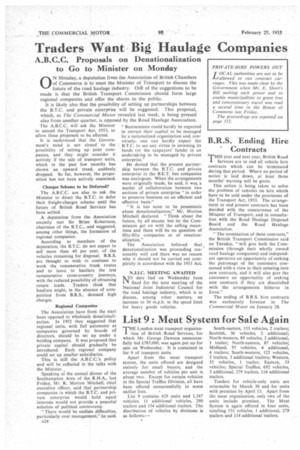Traders Want.. Big: Haulage Companies
Page 26

If you've noticed an error in this article please click here to report it so we can fix it.
A.B.C.C. Proposals on Denationalization to Go to Minister on Monday
0 N Monday, a deputation from the Association of British Chambers of Commerce is to meet the Minister of Transport to discuss the future of the road haulage industry. OA of the suggestions to be made is that the British Transport Commission should form large regional companies and offer the shares to the public.
It is likely also that the possibility of setting up partnerships between the B.T.C. and private enterprise will be suggested. This proposal,
which, as The Commercial Motor revealed last week, is being pressed also from another quarter, is opposed by the Road Haulage Association. The A.B.C.C. will ask the Minister
to amend the Transport Act, 1953, to allow these proposals to be effected.
It is understood that the Government's mind is not closed to the possibility of setting up joint companies, and they might consider it actively if the sale of transport units, which in the past few months has shown an upward trend, suddenly dropped. So far, however, the proposition has not been actively examined.
Charges Scheme to be Deferred?
The A.B.C.C. are also to ask the Minister to direct the B.T.C. to defer their freight-charges scheme until the future of British Road Services has been settled.
A deputation from the Association recently met Sir Brian Robertson, chairman of the B.T.C., and suggested, among other things, the formation of regional companies. According to members of the deputation, the B.T.C. do not expect to sell• more than 40 per cent, of the vehicles remaining for disposal. B.R.S. are thought to wish to continue to 'work the remunerative trunk routes and to leave to hauliers the less remunerative cross-country journeys, with the reduced possibility of obtaining return loads. Traders think that hauliers might, in the absence of competition from B.R.S., demand high charges.
Regional Companies The Association have from the start been opposed to wholesale denationalization. In 1952 they suggested that regional units, with full autonomy as companies governed by boards of directors, should be set up under a holding company. It was proposed that private capital should gradually be introduced. Each regional company could set up smaller subsidiaries.
This is still the A.B.C.C.'s policy and will be reflected in the talks with the Minister. , Speaking at the annual dinner of the Southampton Area of the R.H.A., last Friday, Mr. R. Morton Mitchell. chief executive officer, said that partnership companies in which the B.T.C. and private enterprise would hold equal intere,sts would not provide a peaceful solution of political controversy.
"There would be endless difficulties, particularly over management," he said.
A24 . " Businessmen could hardly be expected to entrust their capital to be managed by a nationalized organization and, conversely, one can hardly expect the B.T.C. to see any virtue in investing its funds (or the taxpayers' funds) in an undertaking to be managed by private enterprise."
He denied that the present partnership between the B.T.C. and private enterprise in the B.E.T. bus companies was analogous. When the arrangements were originally made, he said, it was a matter of collaboration between two sections of private enterprise " in order to preserve business on an efficient and effective basis."
" It is too soon to be pessimistic about denationalization," Mr. Morton Mitchell declared. "Think about the future, by all means, but let the Commission get on with the selling meantime and there will be no question of fifty-fifty companies or of renational ization."
The Association believed that denationalization was proceeding rea-* sonahly well and there was no reason why it should not be carried out completely in accordance with the 1953 Act.
MEETING AWAITED
NO date had on Wednesday been fixed for the next meeting of the National Joint Industrial Council for the road hiulage industry, which is to discuss, among other matters, an increase to 30 m.p.h. in the speed limit for heavy goods vehicles.




















































































